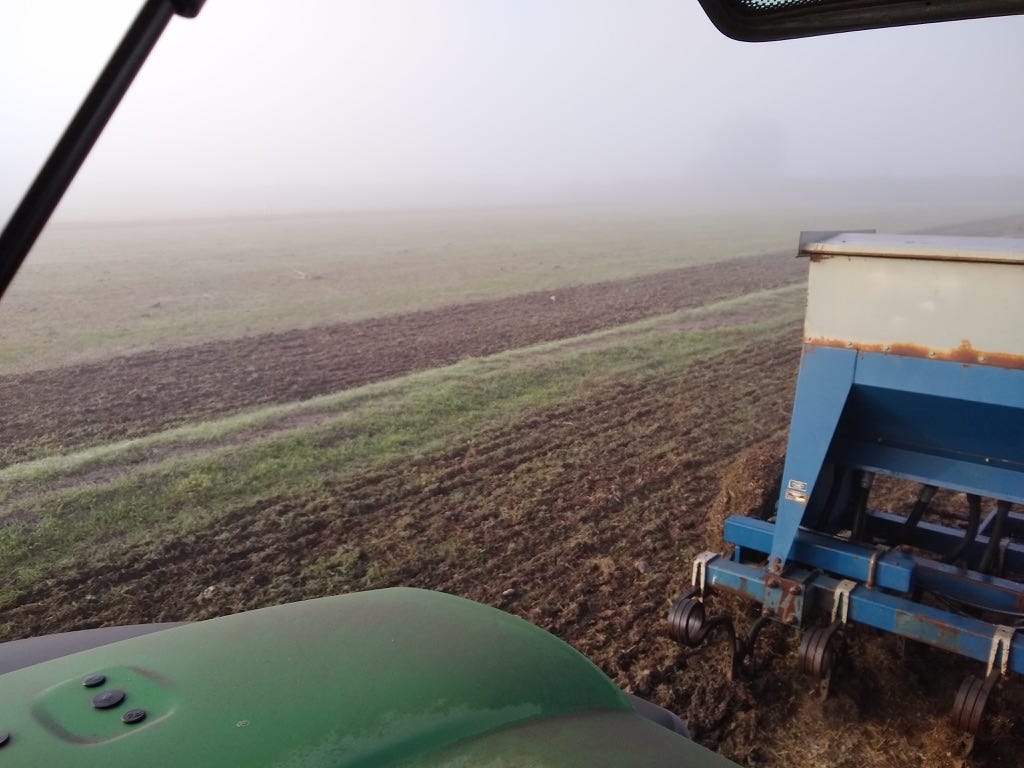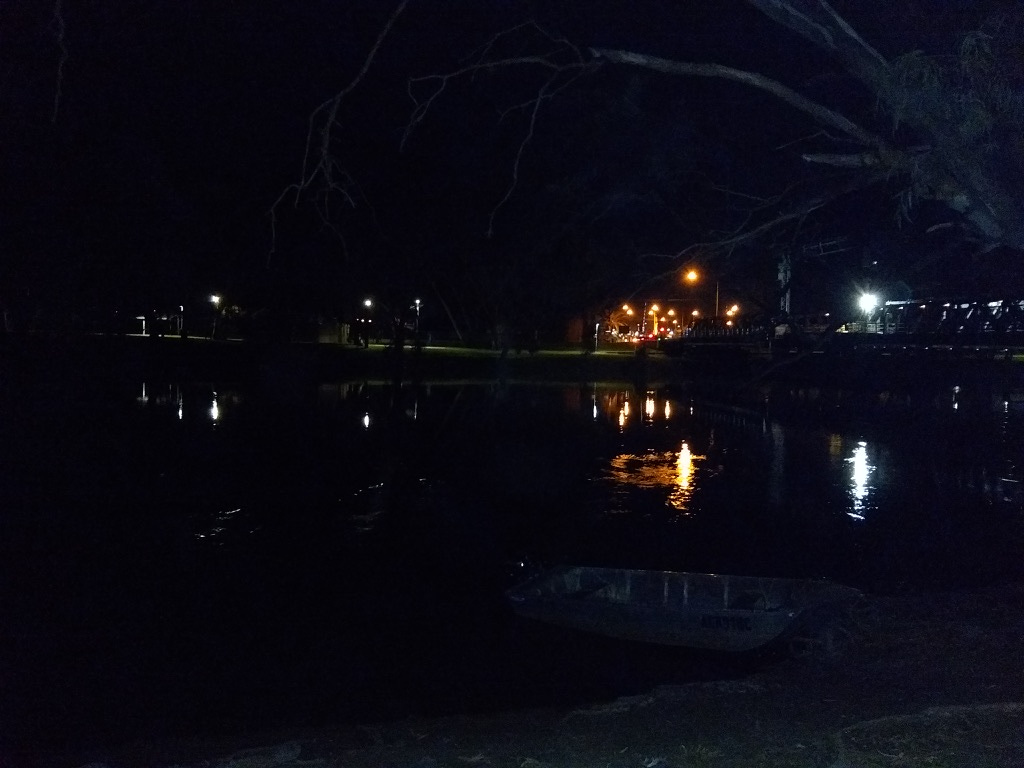On the Way to the Beginning: The Dark Before Dawn
Applying an anecdote, a few thoughts and a Chesterton quote to the idea of creative passion.
I mentioned in On the Way to the Beginning: The Edit that the progress of writing and editing Silent Skies has been slow — due in part to self-doubt. One form of healthy self-doubt that I was thinking of is the quest to partner with God’s will (or wisdom) in one’s writing and storytelling.
Personal as the following anecdote may be, I realise some readers may find these thoughts about it helpful or at least interesting. I also realise that the anecdote and my thoughts here are incomplete — as thoughts and anecdotes must ever be when contemplating the quest of a lifetime.
Everyone has — or will have — at least one great dream, plan, passion, goal or comfort in their life that they must learn to give up for Christ. We cannot serve two masters. We can only pray that when Christ comes and encourages us — as He encouraged the rich young ruler — to sell what we have, give the money to the poor and follow Him, we might be saved by His grace when we almost inevitably fail.
When I was eighteen, I sat drinking tea late into the evening with a mentor of mine and his wife. I had had something on my mind, troubling me, for a few days. Earlier in the week, during an introductory lecture to the missional apprenticeship I was beginning, we had read through the story of the rich young ruler — and a thought had been niggling at me ever since.
If Christ asked me to give up my writing, would I?
Let me briefly explain one aspect of why this was such a terrifying question for me.
One summer, when I was four or five, my mum and eldest sister read The Lord of the Rings aloud to my siblings and me. While I’m sure that much of the content from those readings did not linger in articulable memory, they were stories that sank deep.
Furthermore, I watched Jackson’s film adaptations when I was six (and I will be ever thankful that my parents allowed this, even though I always hid under the couch during Gollum’s first scene and throughout the sequence with Shelob). I remember very much liking the fact that the director’s name was Peter — it was the first line of the credits to come up after each film, so how could I miss it?
It is now quite clear that I wanted to participate in this epic story because when I was eight, I started drawing pictures of ‘Peter, son of Aragorn, Dúnadain Ranger’ and — following the advice of one of my brothers — I stapled the pictures together to form a number of storybooks.

My love for crafting stories grew from there, and by the time I was eighteen, writing seemed an irrevocably established aspect of my identity — hence the terror of the question:
If Christ asked me to give up my writing, would I?
Of course, some part of me knew that God would probably never ask me to stop writing — but that did not erase the need to try to give Him authority over it …
I believe it was nearly 11 p.m. when I stumbled my way into this thought that evening. The question troubled me such that when it came into the conversation, I all but fell to pieces — utterly disturbed to discover that perhaps Christ didn’t have the highest seat in my throne room.
My mentor looked at me with the earnest understanding that I would grow to know well in my two years alongside him. He then explained something that perhaps every Christian artist will come to contemplate at some point in their creative journey. He explained that a creative yearning is a seed that will only yield good fruit once it is planted in the Father’s wisdom (and this subtly begins to hint at the idea that it may be more practical advice to search for God’s face rather than for his will — to search for His character and wisdom, revealed through the transcendentals, and let that inform your understanding of His will). The yearning is a gift that a parent gives a child, perhaps in order to be delighted by what use their child puts it to — and to help their child grow through the act of trying to create.
Very truly I tell you, unless a kernel of wheat falls to the ground and dies, it remains only a single seed.
John 12:24 (NIV)
Now, wisdom is personified as a lady throughout the book of Proverbs, so when I write ‘the Father’s wisdom’, I am describing something feminine, mysterious, veiled and dark. In fact, I must — if I also use the masculine symbol of the seed. Wisdom is the dark, undefined space or potential that we must reach, speak or sow into and create out of … I can feel the earth getting a little shaky — the Feminine protesting at my attempt to describe it — so I’ll wrap this point up with an obligatory caveat: these masculine and feminine symbols exist in us all, of course, to varying degrees, regardless of our sex.

So, this healthy self-doubt or tension that slows me down often feels like the prompting to give over once again that seed — that yearning — and to strive to remember why I want Christ more; to plant the seed in wisdom; to remember that passions can become zealous, then tyrannical, then crippling if they are not subservient.
Over the years that have followed that evening, I have struggled with my pride and my passion for writing. For nearly two years, I went down to the river in the dark before dawn (before heading to the dairy farm pictured above). There in the water, I would try to die to my passions and at least begin the day with some level of discipline, contrition and maybe even — God willing — self-forgetfulness.
The following is something I wrote when thinking about one of the ways those early swims helped me loosen my grip on my desires.
The iridescent glow of lingering starlight lit the air in a silver fire, dancing on the dewy clover between his toes. Not yet a single murmur of a bird was heard. Not yet a single photon of dawn’s grey eminence had seeped across his world. Not yet could worry hold him captive nor shame form its false distance between him and his Father.
His Father was in the cold, burning air around him. The air that filled his body with a warmth that defied his numb toes. His Father was working in him. A change was whispering its name … his name … the boy’s very own name.
The whisper was in the rustling riverside red gums. It was in the ripples left by the disappearing denizens of the river’s surface, and it was in the hushing of their wings. It was in the icy water—black and cold and vitalising. It was in the potential of an unburnt bonfire, waiting for its time to be alive.
‘Redeem me,’ whispered the boy, and he lowered his head beneath the water.
I’ll finish with a few practical notes that land me once again on the idea that a creative project requires a paradoxical commitment to both getting it right and not caring if you succeed (necessitating an aspect of play in the process).
The term ‘passion project’ might be a helpful descriptor for those attempts at creation where the artist becomes too concerned with the seriousness of getting something right — much like a suitor or spouse too serious about getting romance right. The lack of play or wise carelessness renders an artist and a wooer impotent (an idea I expanded on in On the Way to the Beginning: Pulling and Following a Story). This is probably because they have elevated their project too high while grasping it too firmly. They have cradled their seed in desperate worship instead of lowering it to be planted in the Father’s wisdom that He might raise it up according to His will — a trap I have often fallen into.
G K Chesterton, in The Ball and the Cross, writes of this wise carelessness in relation to dire circumstances:
Father Michael, in spite of his years, and in spite of his asceticism (or because of it, for all I know), was a very healthy and happy old gentleman. And as he swung on a bar above the sickening emptiness of air, he realized, with that sort of dead detachment which belongs to the brains of those in peril, the deathless and hopeless contradiction which is involved in the mere idea of courage. He was a happy and healthy old gentleman and therefore he was quite careless about it. And he felt as every man feels in the taut moment of such terror that his chief danger was terror itself; his only possible strength would be a coolness amounting to carelessness, a carelessness amounting almost to a suicidal swagger. His one wild chance of coming out safely would be in not too desperately desiring to be safe.
Finally, in religious terms (terms often so practical and simple that they slip through the tangled webs of our minds without adequate snagging for us to take heed), I have come to understand that the giving over of the creative seed to the Father is most obviously achieved through baptism, confession and communion. It can be given over by regularly (or religiously) considering how your yearning and gifts might help grow gardens of goodness wherein the repatriate and the host can abide and flourish — which ties this topic neatly together with a contemplation of the transcendentals, and a contemplation of beauty, truth and goodness might be just about the wisest, most practical suggestion I could leave a fellow yearning creative with.
~
Peter Harrison



In cultivating this attitude of not caring, not taking myself too seriously, I often return to another thing Chesterton said: "Angels can fly because they take themselves lightly."
God bless you!!
I would very much like to one day hear a tale of this spinifex mouse